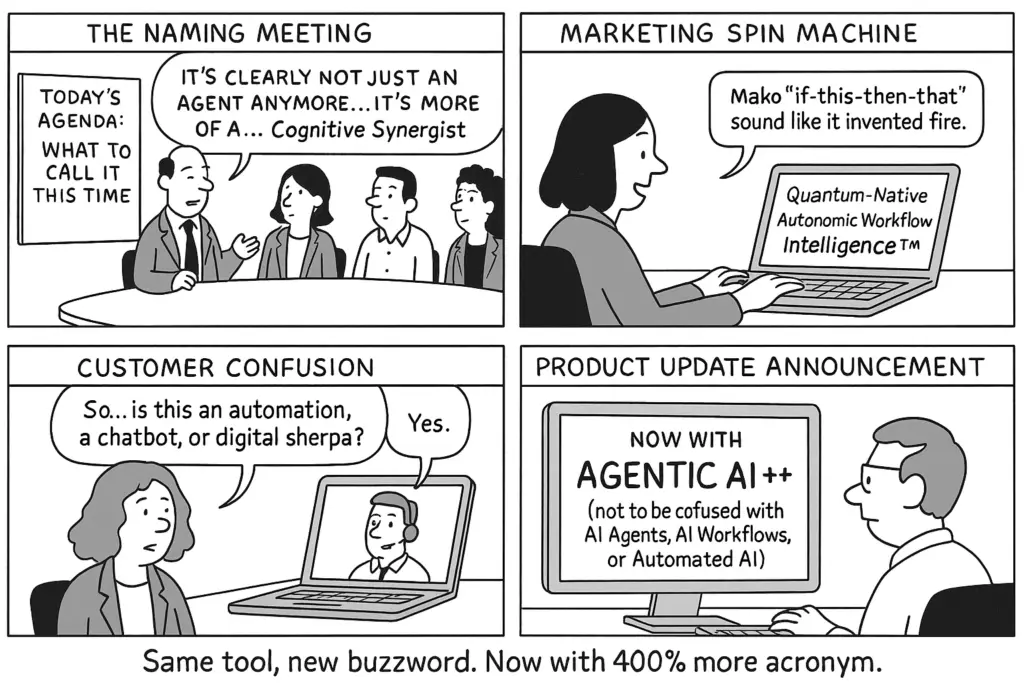The rise of AI has brought with it not just new capabilities, but an ever-expanding glossary of terms. Automation. AI workflows. AI agents. Agentic AI. Depending on who you ask, each term either marks a revolution—or just another rebrand of a glorified “if-this-then-that” logic. As teams race to adopt smarter tech, a growing debate has emerged: are we evolving the tools, or just the terminology?
AI Automation |
AI Agent |
Agentic AI |
|
|---|---|---|---|
|
Definition |
A program that calls an LLM via API for one or more steps |
A program designed to perform non-deterministic tasks autonomously |
A system that sets and pursues goals using memory, planning, feedback loops |
|
Core Foundations |
Boolean Logic & Fuzzy Logic |
Fuzzy Logic & Autonomy |
Autonomy, Memory, Planning, Reflection |
|
Tasks |
Deterministic tasks requiring flexibility |
Non-deterministic, adaptive tasks |
Goal-directed, multi-step processes with self-correction |
|
Strengths |
Handles complex rules |
Adapts to new variables |
Navigates complexity |
|
Weaknesses |
Requires training data |
Less reliable |
Still early |
|
Tool Examples |
Zapier + OpenAI plugin, LangChain (simple chains) |
Autogen, MetaGPT, CrewAI (basic agents) |
OpenAI AutoGPT, Superagent, OpenAgents, LangGraph |
|
Use Case |
Score and route leads using ChatGPT |
Research a lead’s company profile before routing |
Qualify, follow up, and re-engage a lead across channels until booked |
To help unpack this tangled web of buzzwords, we decided to take a step back and look at the absurdity of it all. Because let’s face it—sometimes it feels like the only real innovation is in naming conventions. That’s why we made a comic to poke fun at how quickly and confusingly these definitions escalate. (Spoiler: Cognitive Synergist is not a real job title… yet.)
The Great AI Taxonomy Arms Race

Where Each One Wins (Real-World Use Cases)
✅ Automation
You want speed, consistency, and zero surprises.
Example: A new lead fills out a form → Zapier instantly sends a Slack message to your sales team.
🤖 AI Workflow
You need flexible logic + LLMs in the loop.
Example: A Make.com scenario pulls new contacts, calls OpenAI to summarize their company bio, and routes them to different email nurtures.
🧠 AI Agent
You need the tool to think, not just execute.
Example: An AI agent researches a company’s recent funding news, identifies potential product fit, and drafts a custom cold outreach message for your SDR.
🚀 Agentic AI
You want it to run with the goal and adapt on the fly.
Example: A self-correcting AI assistant reaches out to leads across LinkedIn and email, adjusts tone based on response, books meetings, and updates your CRM—without any manual intervention.
Final Thoughts...
Whether you’re Team Workflow, Team Agent, or just here for the acronym bingo, the truth is that all these tools are converging fast. And while the naming game may never stop, it’s a good reminder that clarity (and a little humor) goes a long way when navigating the AI landscape. Now scroll on, and enjoy the comic—powered by 100% organic, hand-crafted snark.
Please join our conversation on AI for Good Forum on LinkedIn.
1. The Buzzword Game
“What’s the funniest (or most confusing) AI job title or tool name you’ve seen lately?”
e.g., “AI Synergy Curator”? “Cognitive Pipeline Orchestrator”? Share it!
2. The Future Debate
“Which category do you think will win out in the next 12 months: Automation, Workflow, Agent, or Agentic AI? Why?”
